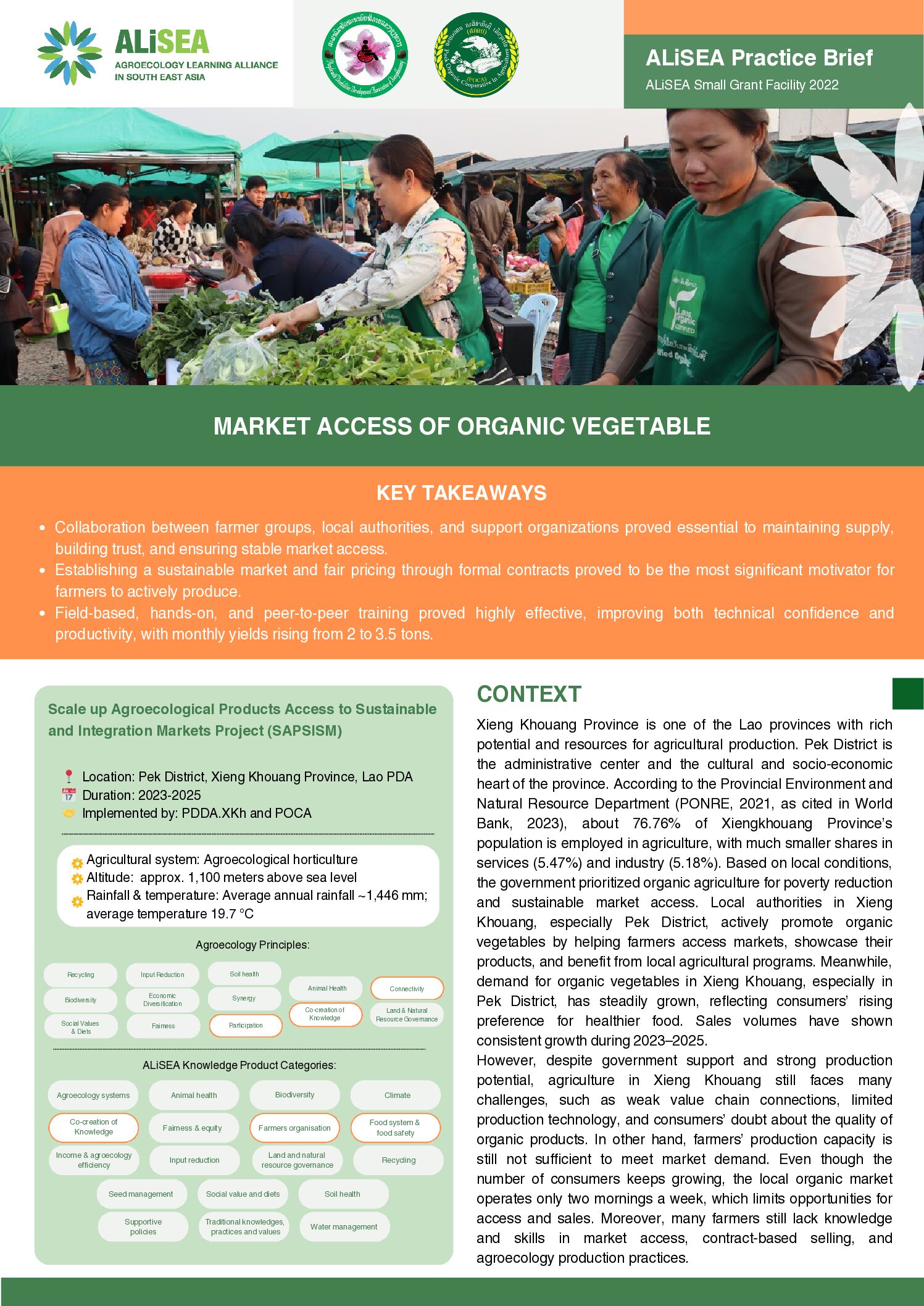
Market Access of Organic Vegetable
– Collaboration between farmer groups, local authorities, and support organizations proved essential to maintaining supply, building trust, and ensuring stable market access. – Establishing a sustainable market and fair pricing through formal contracts proved to be the most significant motivator for farmers to actively produce. – Field-based, hands-on, and peer-to-peer training proved highly effective, improving both technical confidence and productivity, with monthly yields rising from 2 to 3.5 tons
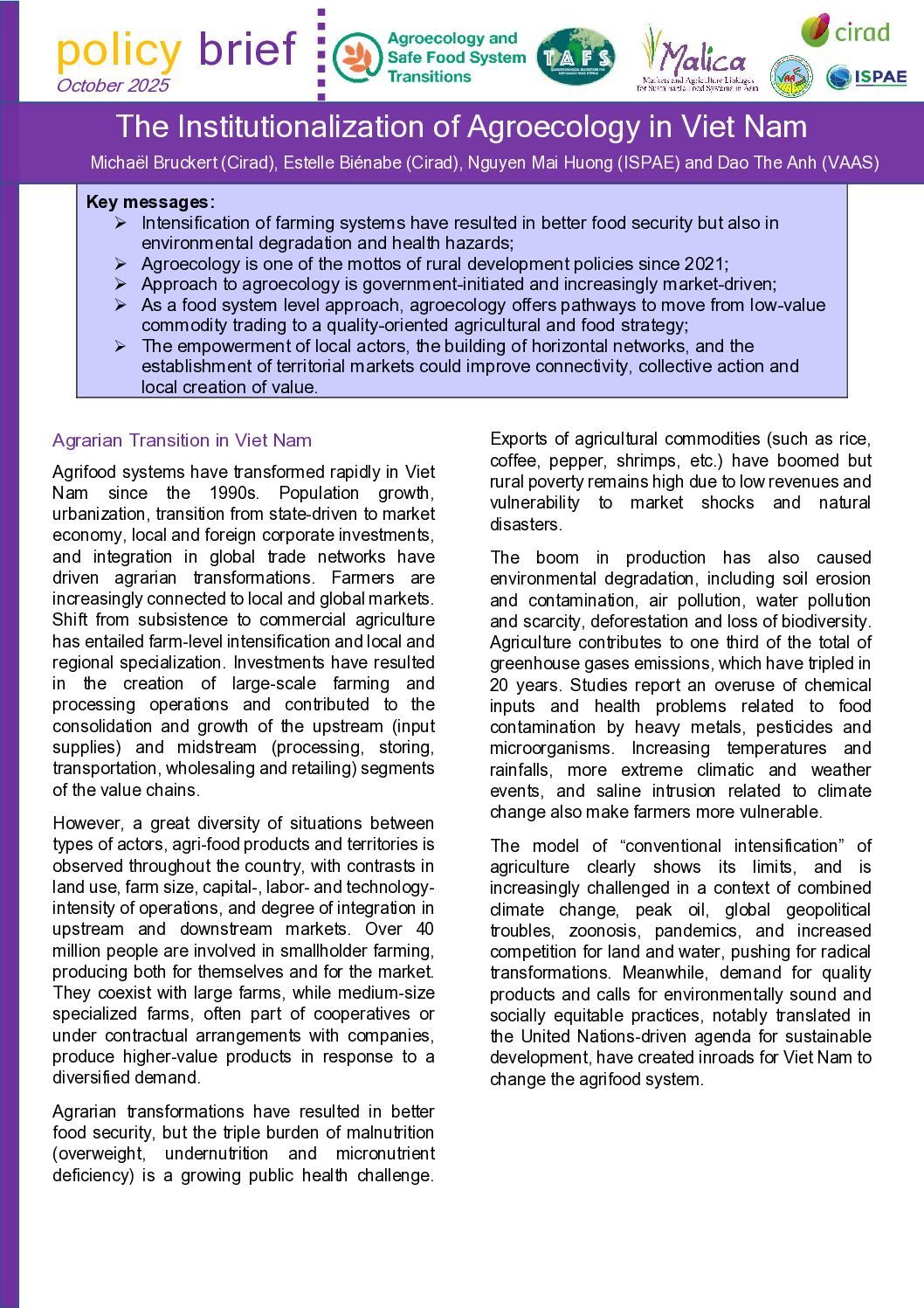
The Institutionalization of Agroecology in Viet Nam
This policy brief, after reviewing agrarian transition, agricultural public policies, actors and organisations supporting Agroecology in Vietnam, presents a rationale to develop agroecology and gives recommendations on different interventions and approaches that could be leveraged by public authorities and other stakeholders to catalyze and bring to scale a full-fledged agroecological transition in Viet Nam.
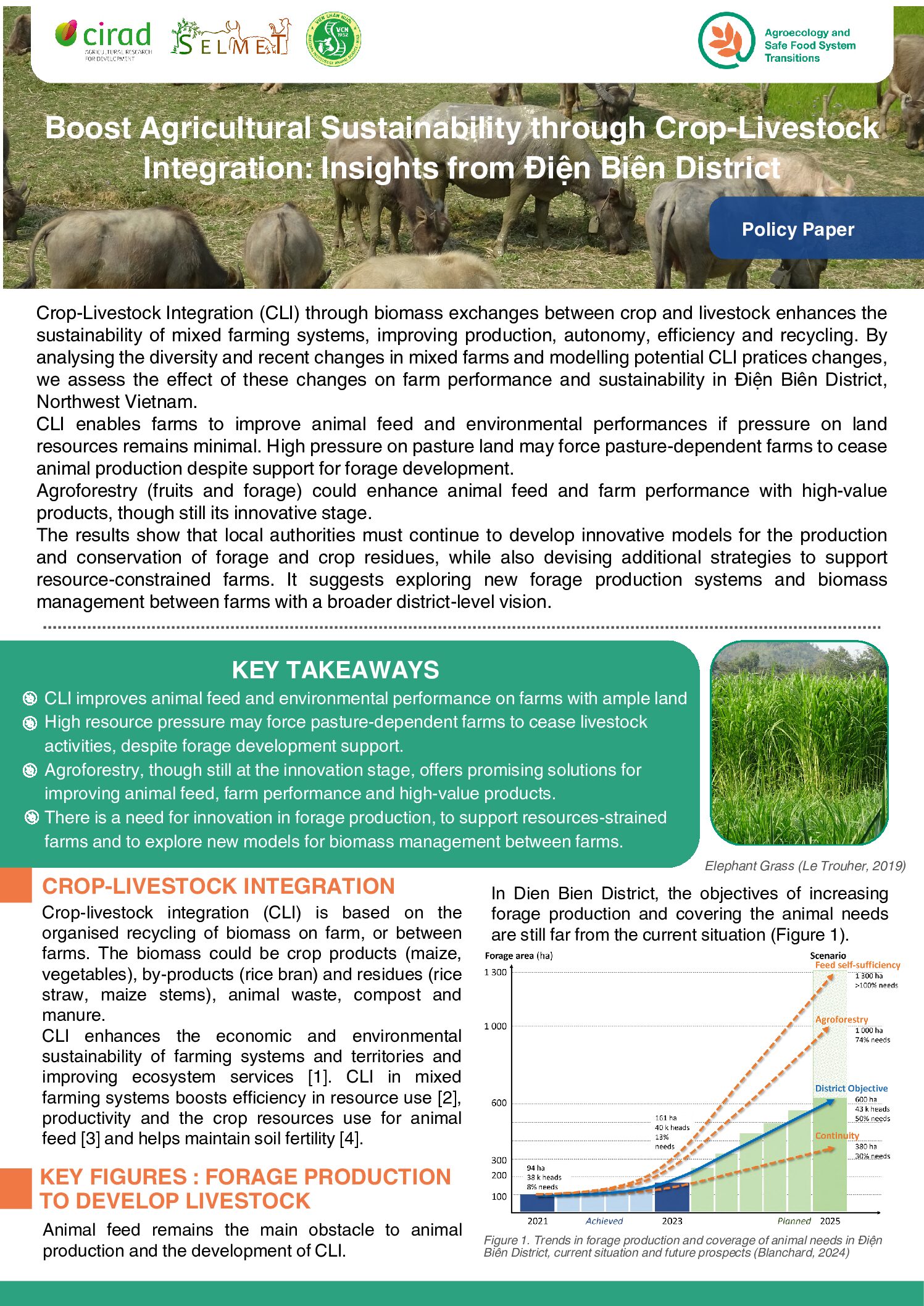
Boost Agricultural Sustainability through Crop-Livestock Integration: Insights from Điện Biên District
Crop-Livestock Integration (CLI) through biomass exchanges between crop and livestock enhances the sustainability of mixed farming systems, improving production, autonomy, efficiency and recycling. By analysing the diversity and recent changes in mixed farms and modelling potential CLI pratices changes, we assess the effect of these changes on farm performance and sustainability in Ðiện Biên District, Northwest Vietnam. CLI enables farms to improve animal feed and environmental performances if pressure on land resources remains minimal. High pressure on pasture land may force pasture-dependent farms to cease animal production despite support for forage development. Agroforestry (fruits and forage) could enhance animal feed and farm performance with high-value products, though still its innovative stage. The results show that local authorities must continue to develop innovative models for the production and conservation of forage and crop residues, while also devising additional strategies to support resource-constrained farms. It suggests exploring new forage production systems and biomass management between farms with a broader district-level vision.
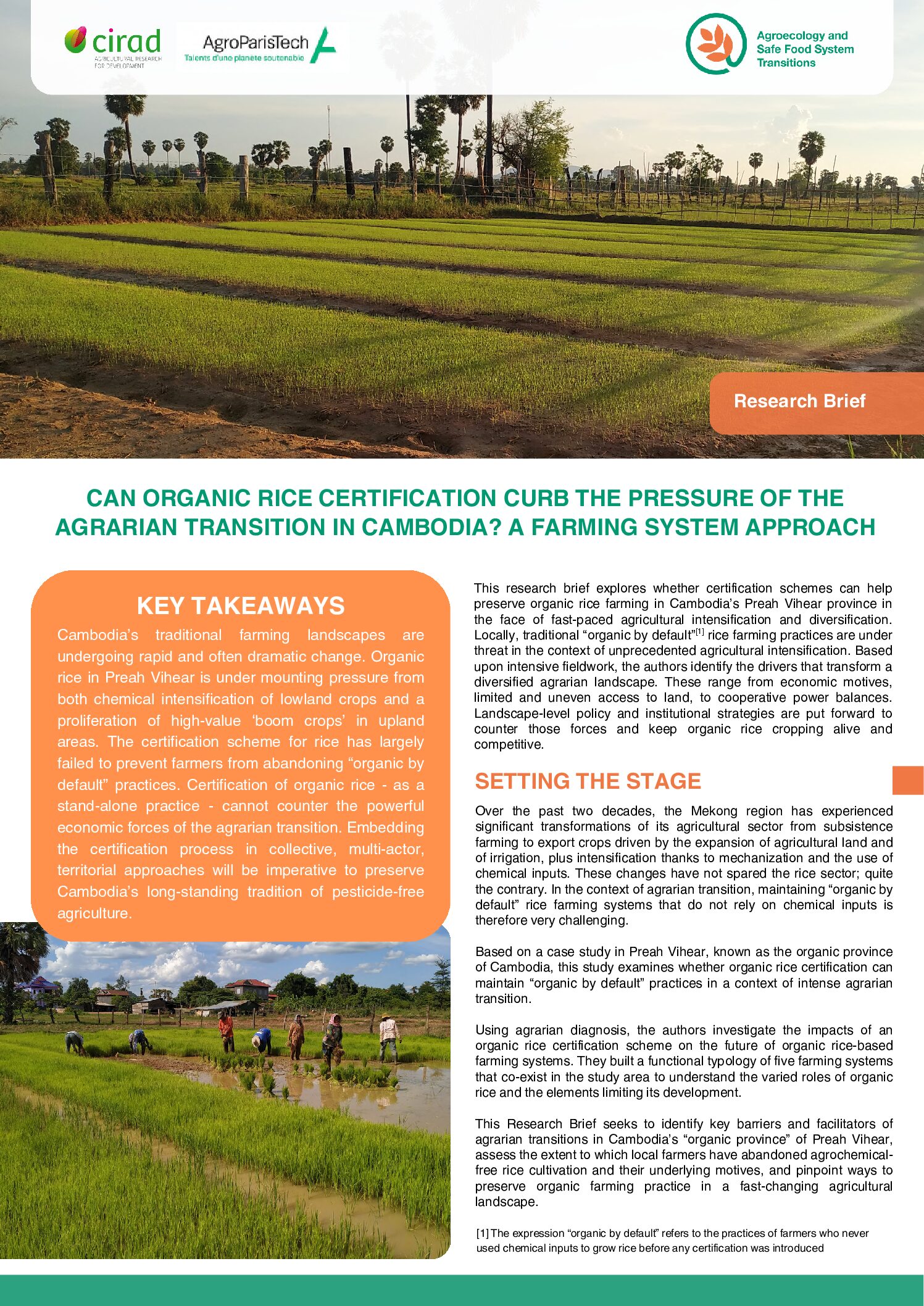
Can organic rice certification curb the pressure of the agrarian transition in Cambodia? A farming system approach
Over the past two decades, the Mekong region has experienced significant transformation of its agricultural sector from subsistence farming to export crops driven by the expansion of agricultural land and of irrigation, plus intensification thanks to mechanization and the use of chemical inputs. In the context of agrarian transition, maintaining “organic by default” rice farming systems that do not rely on chemical inputs, is challenging. Based on a case study in Preah Vihear, the organic province of Cambodia, this paper examines whether organic rice certification can maintain “organic by default” practices in a context of unprecedented agricultural intensification.
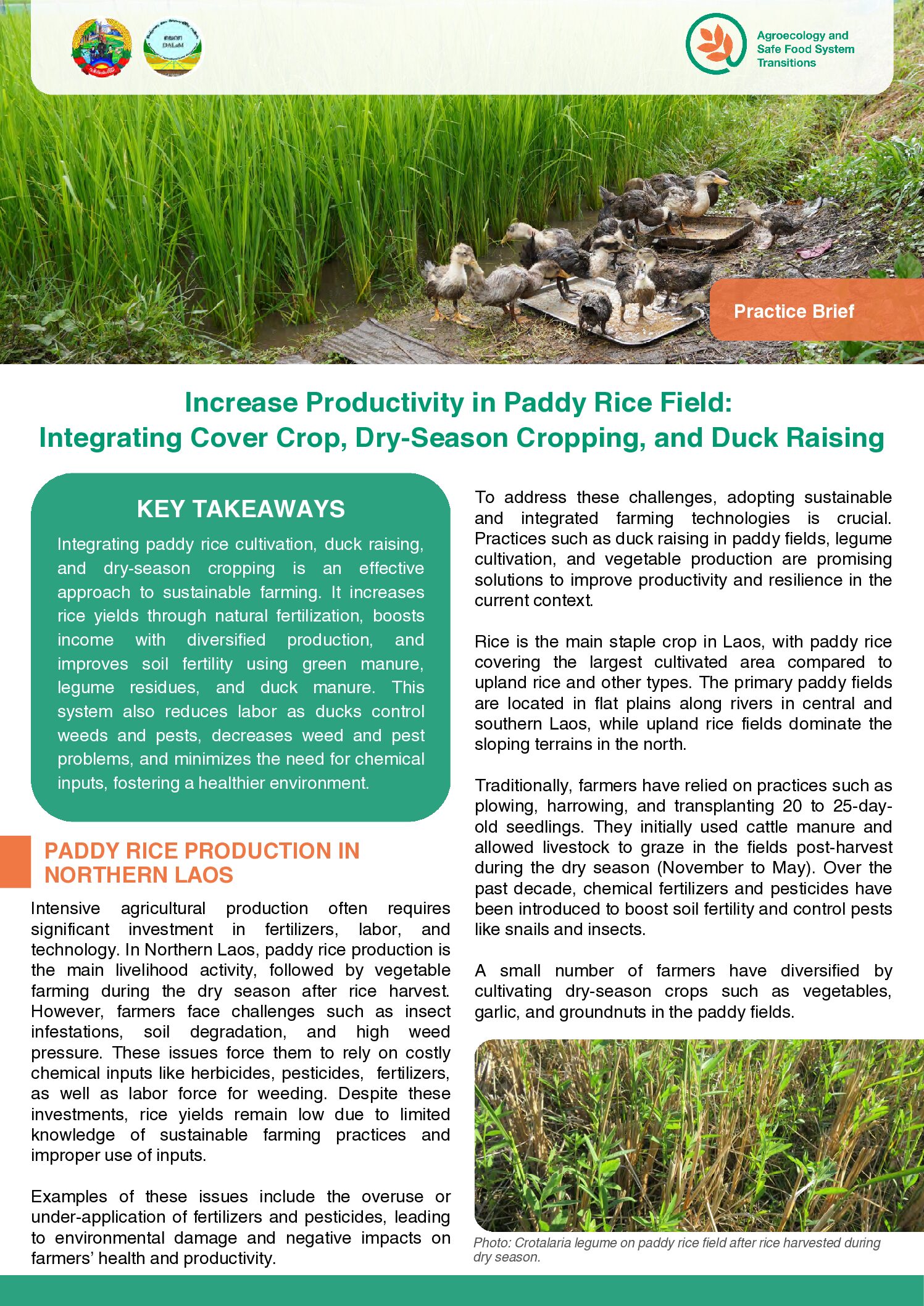
Increase Productivity in Paddy Rice Field: Integrating Cover Crop, Dry-Season Cropping, and Duck Raising
Integrating paddy rice cultivation, duck raising, and dry-season cropping is an effective approach to sustainable farming. It increases rice yields through natural fertilization, boosts income with diversified production, and improves soil fertility using green manure, legume residues, and duck manure. This system also reduces labor as ducks control weeds and pests, decreases weed and pest problems, and minimizes the need for chemical inputs, fostering a healthier environment.
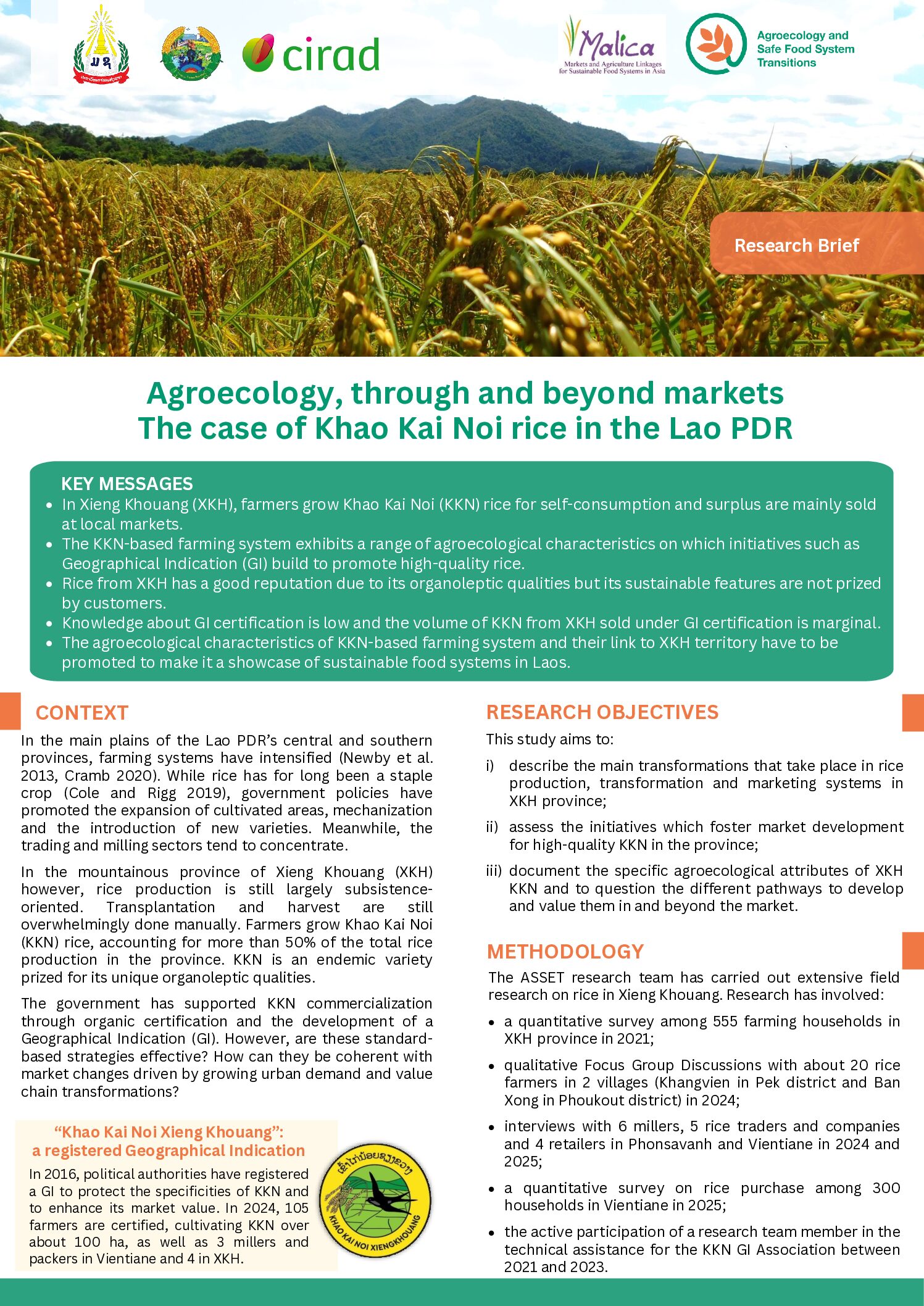
Agroecology, through and beyond markets : The case of Khao Kai Noi rice in the Lao PDR
• In Xieng Khouang (XKH), farmers grow Khao Kai Noi (KKN) rice for self-consumption and surplus are mainly sold at local markets. • The KKN-based farming system exhibits a range of agroecological characteristics on which initiatives such as Geographical Indication (GI) build to promote high-quality rice. • Rice from XKH has a good reputation due to its organoleptic qualities but its sustainable features are not prized by customers. • Knowledge about GI certification is low and the volume of KKN from XKH sold under GI certification is marginal. • The agroecological characteristics of KKN-based farming system and their link to XKH territory have to be promoted to make it a showcase of sustainable food systems in Laos.
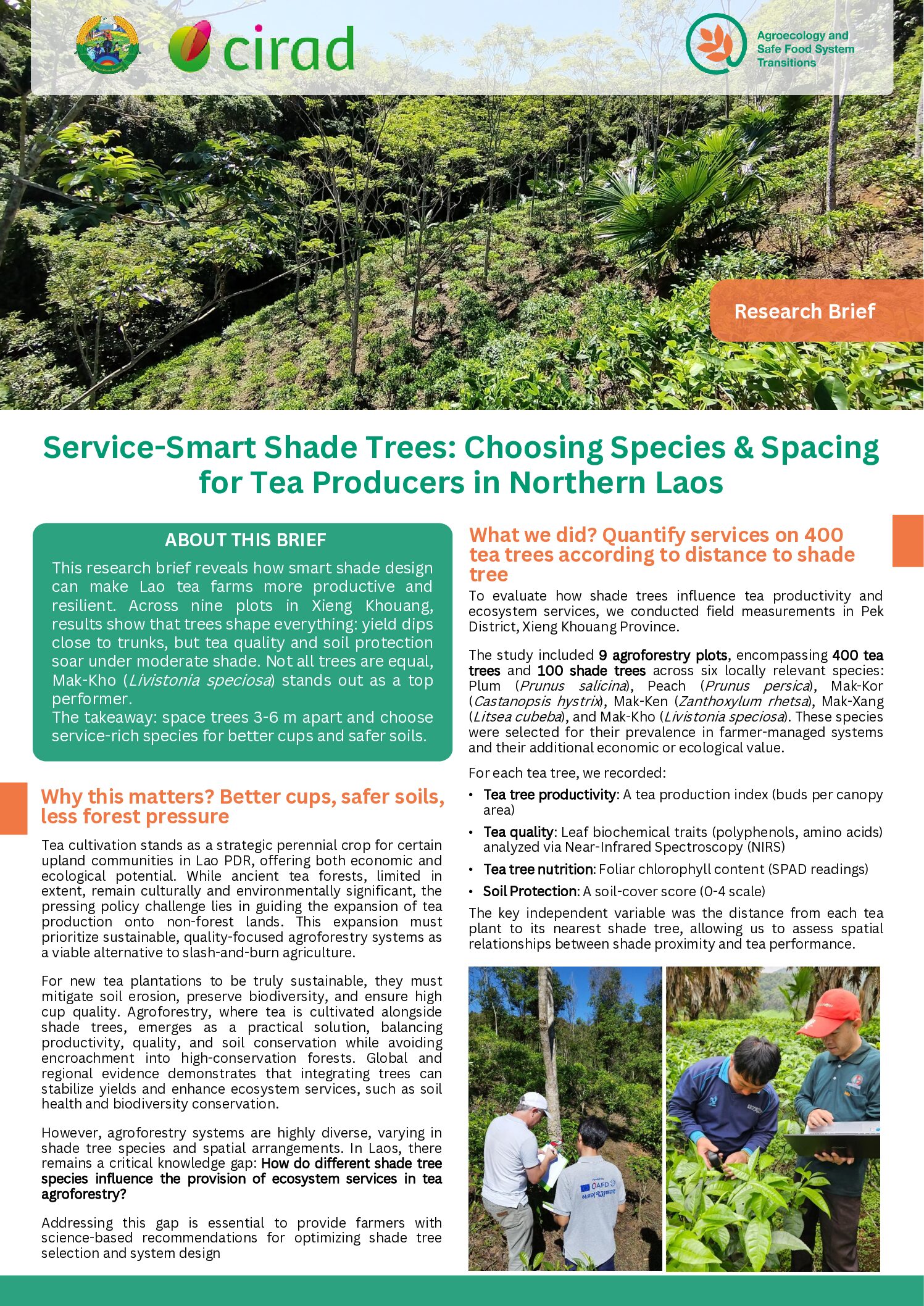
Service-Smart Shade Trees: Choosing Species & Spacing for Tea Producers in Northern Laos
This research brief reveals how smart shade design can make Lao tea farms more productive and resilient. Across nine plots in Xieng Khouang, results show that trees shape everything: yield dips close to trunks, but tea quality and soil protection soar under moderate shade. Not all trees are equal, Mak-Kho (Livistonia speciosa) stands out as a top performer. The takeaway: space trees 3-6 m apart and choose service-rich species for better cups and safer soils.
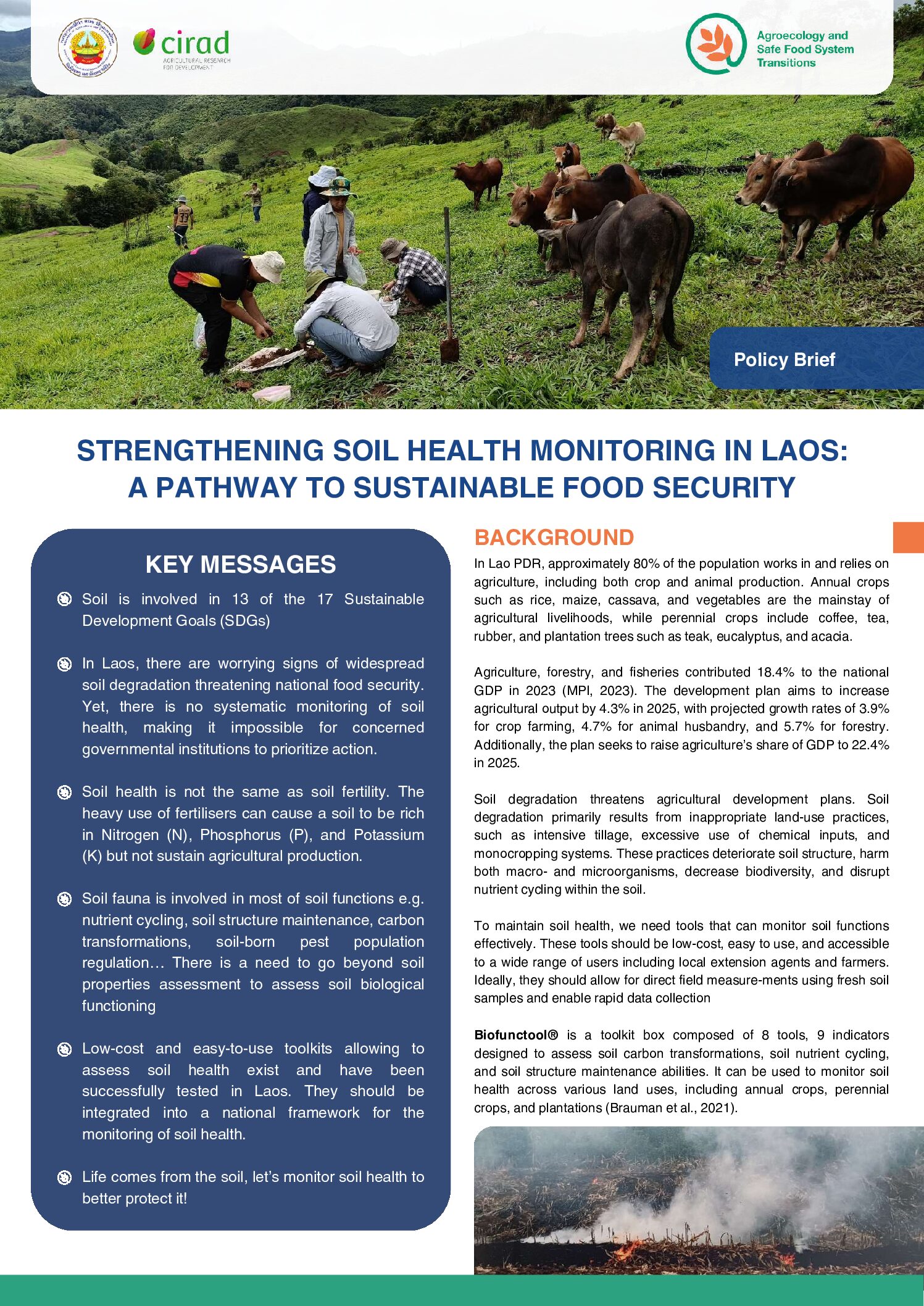
Strengthening Soil Health Monitoring in Laos: A Pathway to Sustainable Food Security
– Soil is involved in 13 of the 17 Sustainable Development Goals (SDGs) – In Laos, there are worrying signs of widespread soil degradation threatening national food security. – Yet, there is no systematic monitoring of soil health, making it impossible for concerned governmental institutions to prioritize action. – Soil health is not the same as soil fertility. The heavy use of fertilisers can cause a soil to be rich in Nitrogen (N), Phosphorus (P), and Potassium (K) but not sustain agricultural production. – Soil fauna is involved in most of soil functions e.g. nutrient cycling, soil structure maintenance, carbon transformations, soil-born pest population regulation… There is a need to go beyond soil properties assessment to assess soil biological functioning – Low-cost and easy-to-use toolkits allowing to assess soil health exist and have been successfully tested in Laos. They should be integrated into a national framework for the monitoring of soil health. – Life comes from the soil, let’s monitor soil health to better protect it!
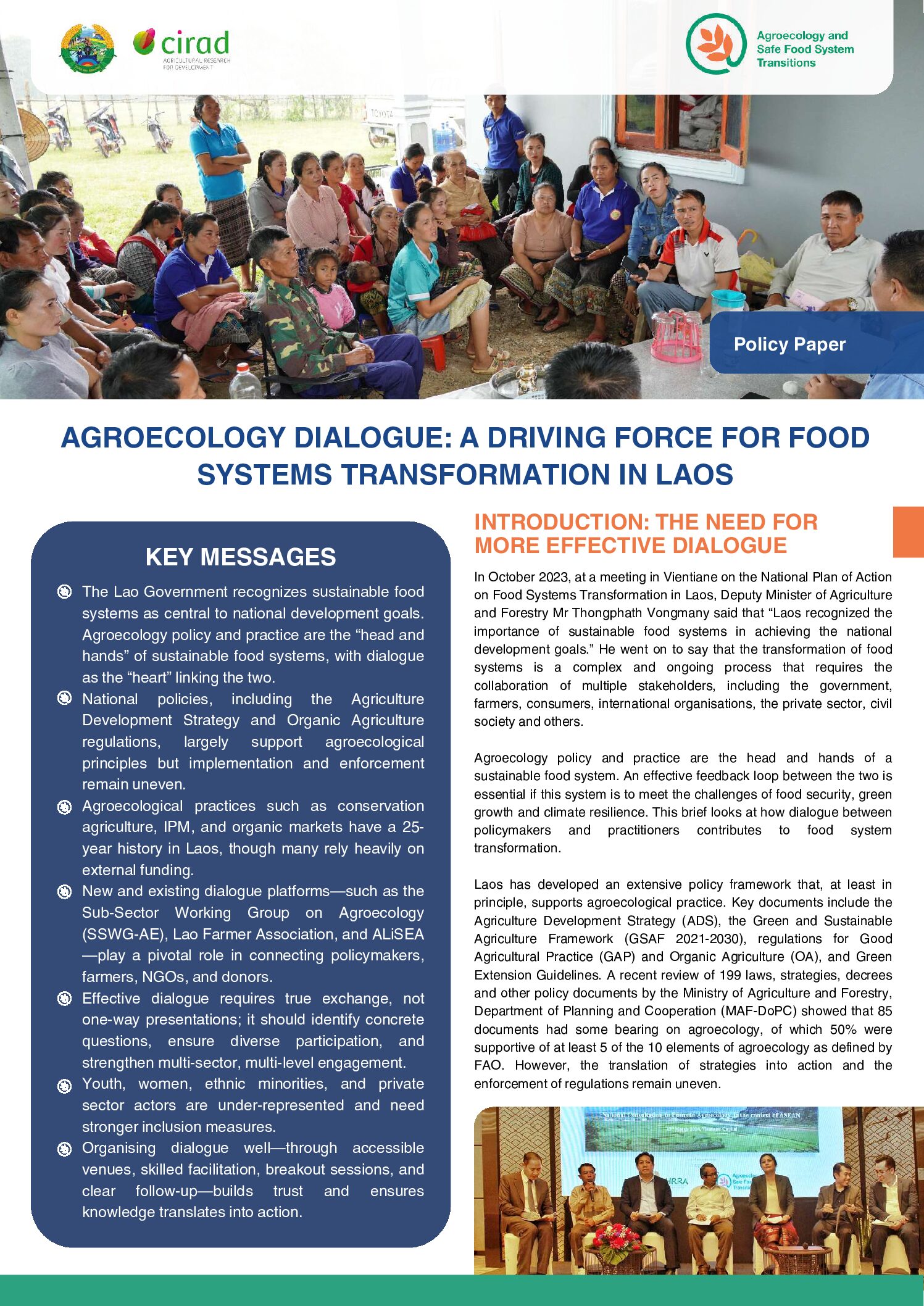
Agroecology Dialogue: A Driving Force for Food Systems Transformation in Laos
– The Lao Government recognizes sustainable food systems as central to national development goals. Agroecology policy and practice are the “head and hands” of sustainable food systems, with dialogue as the “heart” linking the two. – National policies, including the Agriculture Development Strategy and Organic Agriculture regulations, largely support agroecological principles but implementation and enforcement remain uneven. – Agroecological practices such as conservation agriculture, IPM, and organic markets have a 25- year history in Laos, though many rely heavily on external funding. New and existing dialogue platforms—such as the Sub-Sector Working Group on Agroecology (SSWG-AE), Lao Farmer Association, and ALiSEA —play a pivotal role in connecting policymakers, farmers, NGOs, and donors. – Effective dialogue requires true exchange, not one-way presentations; it should identify concrete questions, ensure diverse participation, and strengthen multi-sector, multi-level engagement. Youth, women, ethnic minorities, and private sector actors are under-represented and need stronger inclusion measures. – Organising dialogue well—through accessible venues, skilled facilitation, breakout sessions, and clear follow-up—builds trust and ensures knowledge translates into action.
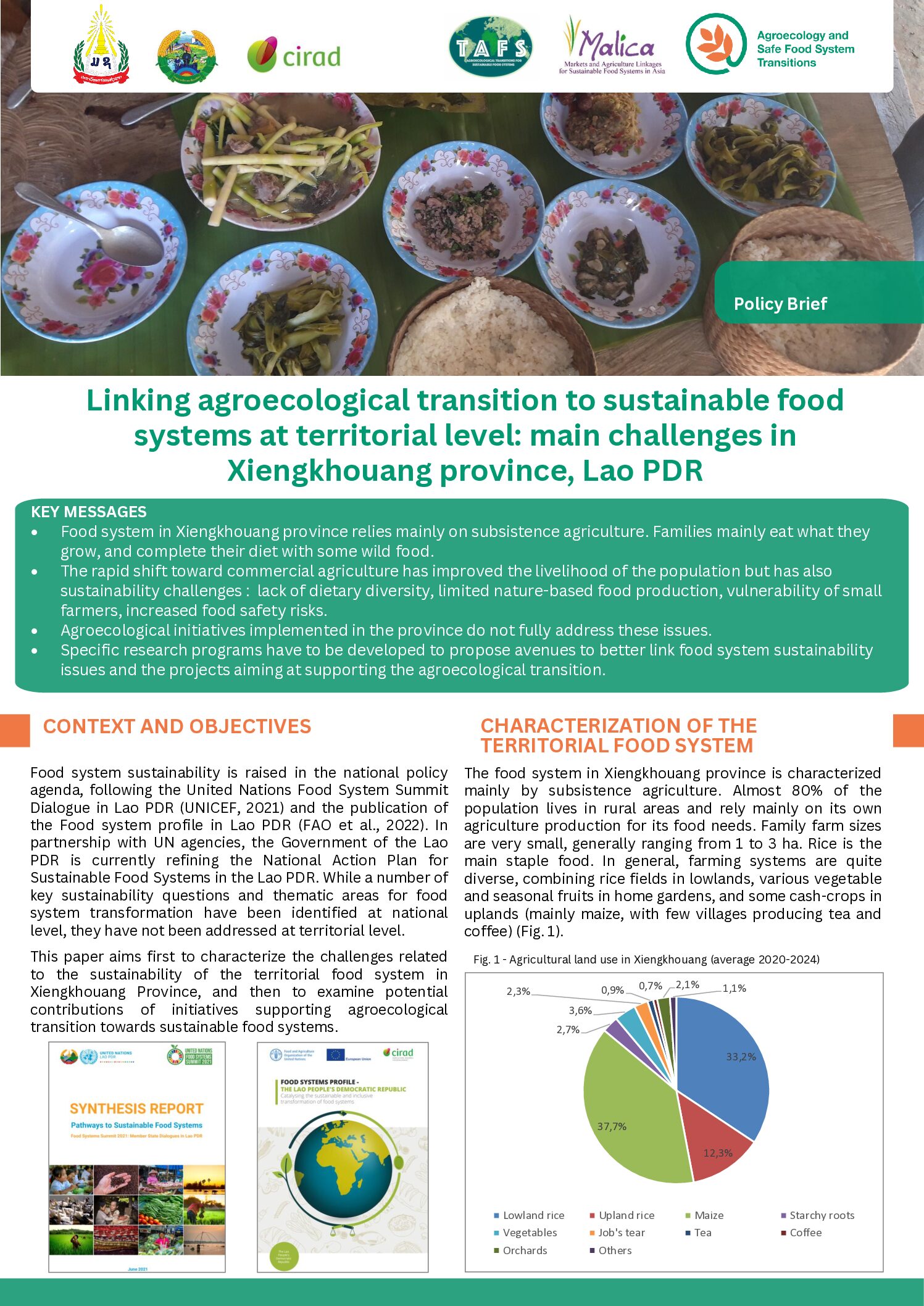
Linking Agroecological Transition to Sustainable Food Systems at Territorial Level: Main Challenges in Xiengkhouang Province, Lao PDR
– Food system in Xiengkhouang province relies mainly on subsistence agriculture. Families mainly eat what they grow, and complete their diet with some wild food. – The rapid shift toward commercial agriculture has improved the livelihood of the population but has also sustainability challenges : lack of dietary diversity, limited nature-based food production, vulnerability of small farmers, increased food safety risks. – Agroecological initiatives implemented in the province do not fully address these issues. – Specific research programs have to be developed to propose avenues to better link food system sustainability issues and the projects aiming at supporting the agroecological transition.







